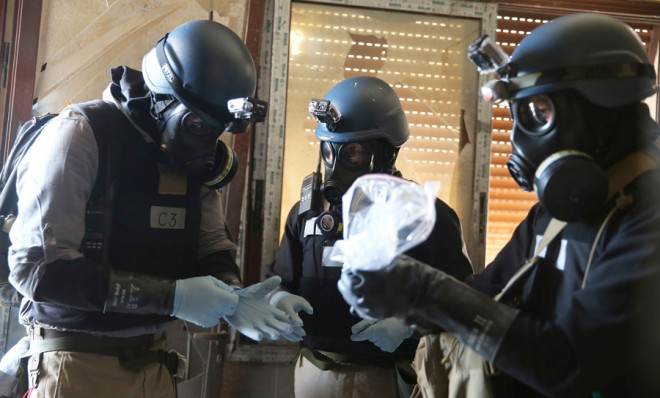Syria's chemical weapons: Would it take boots on the ground to destroy them?
The proposed U.S. air strikes would reportedly leave much of Assad's deadly stockpile relatively unharmed


A free daily email with the biggest news stories of the day – and the best features from TheWeek.com
You are now subscribed
Your newsletter sign-up was successful
President Obama says the U.S. needs to use force to send Syrian President Bashar al-Assad a clear message that the world will not allow him to gas his own people, as he allegedly did last month in an attack the White House says killed 1,400 people behind rebel lines. Obama administration officials say a targeted campaign of air strikes against Assad's missile launchers, air force, and artillery batteries could severely degrade his capability to use his stockpiles of sarin nerve agent, mustard gas, and other deadly poisons again.
Secretary of State John Kerry briefly appeared to leave the door open on Tuesday to sending ground troops, telling Congress that the president might need to preserve the option if Syria "imploded," but he quickly slammed the door shut again, saying, "There will not be American boots on the ground with respect to the civil war."
Pro-intervention lawmakers apparently agree. The Senate and House proposals to authorize a military strike against Syria would limit the duration of the mission to no more than three months, and expressly prohibit sending in American troops.
The Week
Escape your echo chamber. Get the facts behind the news, plus analysis from multiple perspectives.

Sign up for The Week's Free Newsletters
From our morning news briefing to a weekly Good News Newsletter, get the best of The Week delivered directly to your inbox.
From our morning news briefing to a weekly Good News Newsletter, get the best of The Week delivered directly to your inbox.
But would that be enough to neutralize Assad's chemical arsenal? A new study by the RAND Corporation, a respected global policy think tank, argues that air strikes alone would almost surely not be enough. "At the very least," say authors Karl P. Mueller, Jeffrey Martini, and Thomas Hamilton, "accomplishing this objective would require ground forces, and even then it may not be possible to neutralize the regime's entire arsenal."
There is a long list of reasons why bombs and missiles would not do the trick. Assad has one of the world's largest remaining stockpiles of illegal chemical arms — 1,000 tons stored in 50 locations around the country, according to one intelligence report. Many are stored underground, notes Jonathan Marcus at BBC News. Obliterating them all would be nearly impossible, Marcus says, and trying to pull it off might do more harm than good.
Much of it is reasonably close to populated areas — and this is the problem. Attacking such sites with regular explosive bombs might well wreak considerable damage, but it could also open up chemical weapons stocks to the air, disperse them over a large area, and potentially cause large numbers of civilian casualties. [BBC News]
Read the entire RAND study here:
A free daily email with the biggest news stories of the day – and the best features from TheWeek.com
Harold Maass is a contributing editor at The Week. He has been writing for The Week since the 2001 debut of the U.S. print edition and served as editor of TheWeek.com when it launched in 2008. Harold started his career as a newspaper reporter in South Florida and Haiti. He has previously worked for a variety of news outlets, including The Miami Herald, ABC News and Fox News, and for several years wrote a daily roundup of financial news for The Week and Yahoo Finance.
-
 BMW iX3: a ‘revolution’ for the German car brand
BMW iX3: a ‘revolution’ for the German car brandThe Week Recommends The electric SUV promises a ‘great balance between ride comfort and driving fun’
-
 Munich Security Conference: a showdown between Europe and Trump?
Munich Security Conference: a showdown between Europe and Trump?Today’s Big Question Report suggests European leaders believe they can no longer rely on the US for military support – but decoupling is easier said than done
-
 The Week Unwrapped: Have televised confessions quelled protests in Iran?
The Week Unwrapped: Have televised confessions quelled protests in Iran?Podcast Plus, why has Elon Musk turned from Mars to the Moon? And will the BBC prove to be a puzzles champ?
